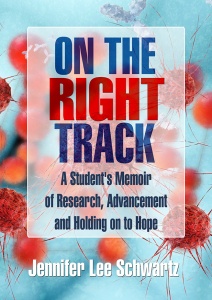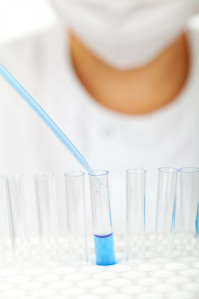One year after graduating from the Ridgefield High School Science Research Program and now having completed college-level introductory Biology, Chemistry, and Math, I am facing a year that could be the polar opposite of the one prior. After holding on to my questions and getting an "I'll get back to you on that" from professors, I finally have the opportunity to launch an investigation. My curiosity can be quenched better than the Wikipedia search under my desk can do. Under the guidance of Dr. Robert Kurt, I will be continuing to research cancer at the college level.
In high school, I chose to research small molecule inhibitors for the treatment of cancer because I thought they were this decade's solution to making chemotherapy just a little bit safer. When asked about next decade's, I would reference immunotherapy. Using the tools your own body gives you to target foreign invaders to attack disease developed internally is simply logical.
Dr. Kurt is a professor of immunology and his research focuses on the involvement of the immune system in cancer. As I read publications from this field in preparation for the semester ahead, I get a sneak preview at the complexity of the world I'm about to explore.
Angela Duckworth says in her 2016 book Grit, "For the beginner, novelty is anything that hasn't been encountered before. For the expert, novelty is nuance." I'm no expert, but the novelty of the immune system in cancer research, to me, is a new approach to the same problem. While it may seem similar, this is not a continuation of my previous work. This is a new project, one that will broaden my skills by weaving together the old and the new experiences and approaches.
To quote Duckworth again, "Enthusiasm is common. Endurance is rare." Stick with what you enjoy and good things will come.


.jpg/1280px-Cancer_cells_(1).jpg) From the first days of my time in the Science Research Program, I began reading article after article about anything remotely biological, without focus on any particular field. I dove into researching the effects of toxins in plastics, birth defects, Down syndrome, Hemophilia and anything else that looked appealing from the title of an article.
From the first days of my time in the Science Research Program, I began reading article after article about anything remotely biological, without focus on any particular field. I dove into researching the effects of toxins in plastics, birth defects, Down syndrome, Hemophilia and anything else that looked appealing from the title of an article. “I have never been able to say that a class has changed me, but The Ridgefield High School Science Research Program is no more a “class” than Google is a webpage. It has taken off from an academic course to a family of students who journey together from early curiosity to self discovery in the science research world. In the process, the students learn how to professionally and appropriately express themselves and share their message with others. This community of learners grows in their abilities not only in science, but in their real-world skills that help a student in every class. Along with these skills, the students also are awarded with incredible opportunities including conducting authentic research and entering elite science competitions. Students’ ‘topics’ are not just projects, these are the ideas that will fuel the future of research and innovation.”
“I have never been able to say that a class has changed me, but The Ridgefield High School Science Research Program is no more a “class” than Google is a webpage. It has taken off from an academic course to a family of students who journey together from early curiosity to self discovery in the science research world. In the process, the students learn how to professionally and appropriately express themselves and share their message with others. This community of learners grows in their abilities not only in science, but in their real-world skills that help a student in every class. Along with these skills, the students also are awarded with incredible opportunities including conducting authentic research and entering elite science competitions. Students’ ‘topics’ are not just projects, these are the ideas that will fuel the future of research and innovation.” “My goal was never, and never will be to ‘cure cancer,’ but rather it is to treat cancer with less harmful side effects. Enhancing the lives of suffering patients is more than what I would ever want to accomplish. Also, I do not believe there ever will be one single cure for cancer. I am confident that there will be major improvements in the future to make curing cancer in certain individuals much easier, but I do not think a ‘cure’ exists beyond dreams.” -Preview of Innovation, the Key to Hope
“My goal was never, and never will be to ‘cure cancer,’ but rather it is to treat cancer with less harmful side effects. Enhancing the lives of suffering patients is more than what I would ever want to accomplish. Also, I do not believe there ever will be one single cure for cancer. I am confident that there will be major improvements in the future to make curing cancer in certain individuals much easier, but I do not think a ‘cure’ exists beyond dreams.” -Preview of Innovation, the Key to Hope
You must be logged in to post a comment.